What a journey I’ve had since arriving in Mozambique 2 weeks ago! This is my second time visiting a country in Africa (my first being Uganda in 2019 for a summer internship through the Campus Y) and I was anticipating flight delays or missing luggage and had booked a flight directly from Lisbon to Maputo, following a week-long trip in Portugal with my mother, to ensure that my belongings would arrive safely with me. The predicted incident happened when we were scheduled to arrive in Maputo at 5am, but were diverted to Johannesburg, an hour flight away, because the city was too foggy for the plane to land. There, the sleepy passengers who had taken a red eye were taken to a lounge (after a few hours of waiting) and after more waiting, were loaded onto a different flight that arrived around 2pm. Our luggage of course was left in Johannesburg but was delivered promptly (shockingly) the next morning. I had no idea what to expect from Maputo, as I had observed photos and videos but was imagining a city such as Kampala (the capital of Uganda) which was entirely overwhelming for me when I had visited as a 19-year-old. However, Maputo proved to be a lovely, slow(er) city with its sunsets at 5:30pm and delectable seafood.
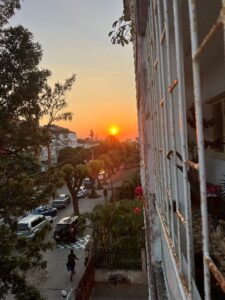
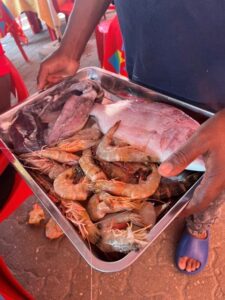
I was warmly welcomed to Maputo by my colleagues at Ipas Mozambique, and as an intern, spent the week getting oriented to the NPO and reading grant reports about the work I would soon be doing in Lichinga, Niassa, a northern province of the country (of which I am now on week two of six). Ipas is an international organization focused on safe abortion access, reducing gender-based violence, and promoting sexual health and reproductive rights (SRHR). Through a grant received by SIDA (Swedish International Development Cooperation Agency), a Reproductive Justice Resource Center is to be established in the Lichinga Ipas office, to foster healthy attitudes about SRHR and provide engaging activities for participants, including local feminist and girls-led groups, enabling them to learn about their physical and mental well-being. Additionally, the Center would assist these women in developing essential social skills including effective communication, self-advocacy, and healthy relationship building. My task has been to help Ipas create a plan for the future development of this Center, which would include its design, creating rules for the space, what activities will be needed or wanted by community members, and imagining how the space will be utilized.
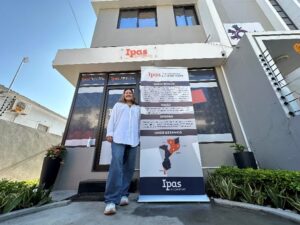
My week whisked by as colleagues took me to various food and scenic spots around the city. I enjoyed salsa and kizomba nights, which struck me deeply, when I realized that so long as there was a salsa/bachata/kizomba (usually all mixed-in during a social) dance group, I had a community anywhere in the world. Two days before I was to leave Maputo, I received a call from the Niassa regional director, and was asked if I would want to tag along on a sight-visit to the Lago district, to see how Ipas worked in communities and regional health facilities. I of course agreed, and the day after I arrived in Lichinga by plane (three hours with a quick stop in Nampula), we were on our way to the Lago district by car. It was around a two-hour drive, on bumpily paved roads that transitioned to unpaved roads, that proved treacherous to my motion-sickness. Our skilled driver maneuvered around and honked at adults, children, motorbikes, chickens, dogs, and goats (I was told that if you hit a goat, you would have to pay its market price because they are prized) so that they would move out of our path, and I realized that cars were the right-of-way on Mozambican roads (at least to an extent of where I would never consider to have my American-college-campus-pedestrian attitude: “I dare you to hit me”). Another thing that I had realized in Maputo and had reaffirmed in Lichinga, was that the distance pedestrians kept to cars was much closer to what I was used to, and I felt my pulse quicken whenever a person came into proximity of our vehicle. (Entertainingly for a colleague in Maputo on a day when we walked to lunch, I had squealed and jogged to get across the road through traffic while they strolled after me and was told “you don’t have to run, they’re not going to hit you. Now walk on the right side of me.”)
We spent three days in Metangula, where I came to learn how Ipas worked in communities and felt a thrill of seeing public health in action. On our first day, there was a three-hour meeting with various community members, hospital administrators, healthcare workers, traditional midwives, and other stakeholders, where my Ipas colleagues facilitated dialogue on issues of SRHR. The emphasis was placed on community-led discussions and those gathered identified issues such as unsafe abortion methods used (mixing many different liquids to ingest), child-brides for the financial benefit of parents, and gender-based violence. All information I received during this meeting was through my regional director, who was translating the Portuguese discussions to me in English, while an older nurse translated Portuguese into a regional language and back again. As a native Japanese-English speaking person, I know how much energy it takes to verbally translate discussions on the spot, and although my middle/high school Spanish skills afforded me a few words here and there, I was immensely grateful to the director for the effort he was putting in for me to learn and be a part of this work. The following two days, we visited the regional hospital where the doctor working for Ipas (of whom the regional director and I were tagging along with) and the Niassa Provincial Director of Maternal Health for the Mozambican Ministry of Health (she must accompany Ipas whenever the NPO interacts with public health facilities) looked over abortion record-keeping methods and correcting errors, trained health workers in vacuum aspiration, and made sure that abortion medication was supplied at the hospital. There was also a task force convened for the healthcare workers that again was facilitated by the Doctor, but was lead largely by the medical staff, to continue to promote safe abortion. Finally, I was also able to visit a local radio station that has 40,000 listeners in the region that Ipas has partnered with to create educational content that promotes Ipas’ mission of expanding reproductive justice.
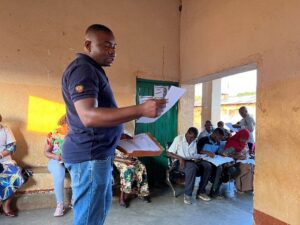
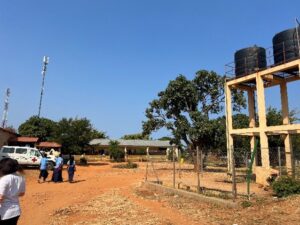
During these three days, I realized how complicated and multi-layered the work Ipas does, working at all different levels of healthcare and working to tie in community members and local organizations to their work. I also learned about the barriers that exist at every step, including cultural stigma, corruption (the illegal medicine-selling business in Mozambique is big), and the retention-issue of medical workers. I even was able to experience Mozambican medicine, up close and personal, when upon returning to Lichinga, I fell ill with diarrhea, vomiting, and body aches, and was taken to the local hospital where they took a blood sample to see what the issue was (they suspected food poisoning or water contamination) and received an IV. Now that I am feeling better and am sticking to bottled water only (I was using filtered water instead, not tap water!) I am ready to get back to work and am excited to see what else I learn during my time here.
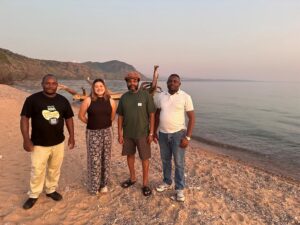
Alyssa Cooper
